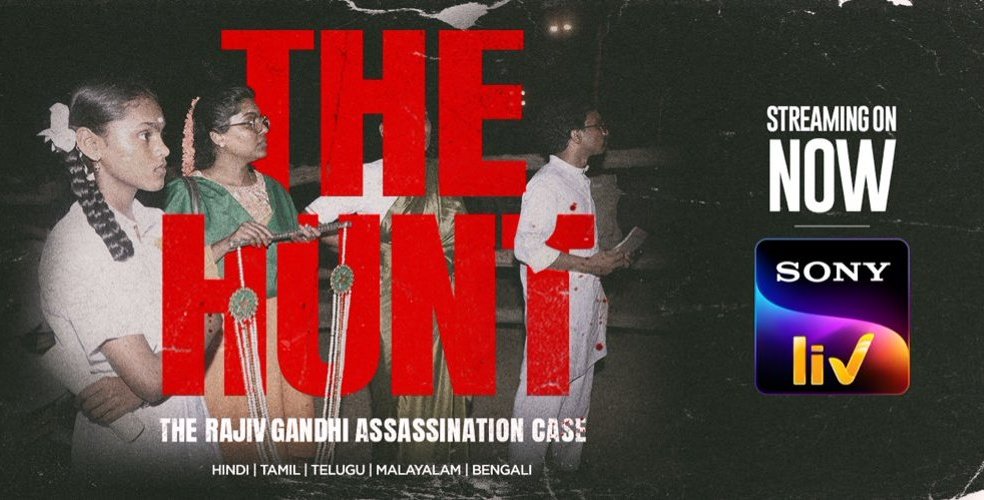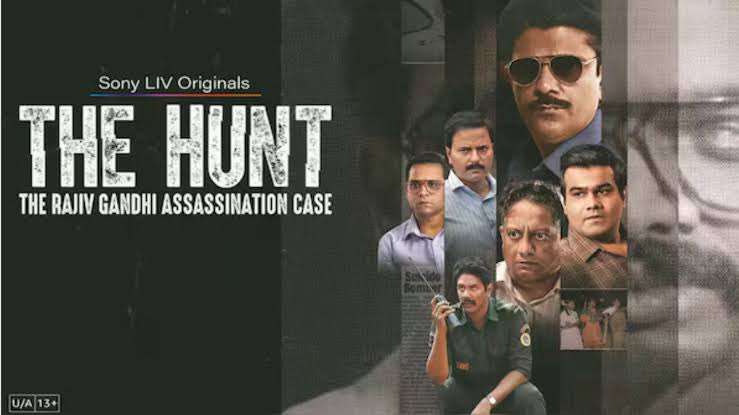The Hunt for Justice: The Rajiv Gandhi Assassination Case : Why the New
Web series on Sonyliv Directed by Nagesh Kukunoor Has Everyone Talking
The year was 1991 — on May 21st at 10 PM — when former Prime Minister of India, and the then most popular candidate in the elections, Rajiv Gandhi was killed by a suicide bomber during an election rally at Sriperumbudur, Tamil Nadu.
The Assassination
A young woman approached Rajiv Gandhi under the pretext of garlanding him. As she bent down, she detonated an RDX-laden belt bomb hidden beneath her dress. What now seems like a shocking breach of security turned into one of independent India’s greatest tragedies. Among the casualties were Congress leaders, police personnel, and ordinary citizens who had come to catch a glimpse of their beloved leader. At least 14 people were killed, and many others were seriously injured.
It didn’t take long for the Special Investigation Team (SIT), CID, and Tamil Nadu police to identify the reason behind the ghastly assassination. The woman who carried out the suicide bombing was a member of the Liberation Tigers of Tamil Eelam (LTTE) — an extremist organisation from Sri Lanka fighting for a separate Tamil state.
The LTTE Connection
Despite being banned in India, LTTE operatives — often referred to as the “Tigers” — enjoyed underground sympathy in Tamil Nadu. They mingled with Tamil refugees and used the long coastline to travel to and from Jaffna, using safe houses and covert networks — until Rajiv Gandhi’s killing changed everything.
Kalaivani Rajaratnam, alias Dhanu, was chosen as the suicide bomber by Sivarasan, a trusted aide of LTTE chief Velupillai Prabhakaran. The motive was clear. Rajiv Gandhi had sent the Indian Peace Keeping Force (IPKF) to Sri Lanka under the Indo-Sri Lankan Accord of 1987, aimed at disarming the LTTE and restoring peace. The mission turned disastrous, leading to heavy casualties and resentment among Tamils. Although IPKF was eventually withdrawn, the LTTE never forgave Rajiv Gandhi.
During the 1991 elections, Rajiv Gandhi had remarked in an interview that the LTTE would have to disarm, hinting that he wouldn’t hesitate to send Indian forces again. This made him a clear target.
The conspirators — Dhanu, Sivarasan, Subha (a backup suicide bomber), and others — entered India much in advance to plan and execute the assassination. Simultaneously, a backup team arrived in New Delhi in case the Tamil Nadu plan failed.
On that fateful day, Rajiv Gandhi was not initially scheduled to visit Sriperumbudur, but his campaign trail eventually brought him there. Mere minutes after his arrival, he was killed in the blast, leaving the nation in shock and mourning.
The Investigation
A Special Investigation Team was formed immediately. Soon, a now-iconic photograph emerged — Dhanu, garland in hand, standing beside a senior Congress leader and her daughter Kokila, both of whom also died in the blast. The image was captured by a camera found at the site — later confirmed to belong to Haribabu, a photographer and LTTE sympathizer who documented the assassination and perished in the explosion. His camera survived — and it led investigators to the assassins.
The 90-day investigation that followed was filled with high-stakes operations, intelligence breakthroughs, and near-misses. While the team succeeded in identifying and eliminating the key conspirators, they failed to capture Sivarasan alive — he killed himself along with Subha when cornered.
Throughout the investigation, many questions were answered, but many others emerged — some still unanswered decades later. This was not merely a criminal probe; it became a tale of sacrifice, ambition, politics, and betrayal.
The story also raises moral and philosophical dilemmas: the LTTE cadre, trained to blindly follow orders and die for their cause; sympathizers, who supported them despite the risks; and others, who were coerced into involvement. Then there were the politicians, whose decisions triggered catastrophic consequences. Officials, despite facing bureaucracy, pursued justice with courage and clarity — some driven by patriotism, others by a sense of duty.
It also underscores the politics of the land, where “one person’s hero is another person’s villain.” The Rajiv Gandhi assassination case is more than a clean investigation — it is a multifaceted narrative filled with layers of human emotion, ideological rigidity, systemic failure, and ethical questions.
There are lessons to be learned, truths to be unearthed, uncomfortable questions to be asked, and mysteries still unresolved. Despite several books and films on the subject, the latest web series on the assassination has reignited national interest.

The Web Series
The Hunt: The Rajiv Gandhi Assassination Case, streaming on SonyLIV, is directed by Nagesh Kukunoor. Based on the bestselling book Ninety Days: The True Story of the Hunt for Rajiv Gandhi’s Assassins by journalist-author Anirudhya Mitra, the series has struck a chord with viewers. Kukunoor deserves credit for the sharp casting and taut narrative that retains the tension, moral ambiguity, and intrigue of the investigation.
Will the new web series have any political implications in current times. Nagesh clarified in his interview with IANS – “I have done it to the best of my ability. I have handled it with utmost sensibility. I have made sure that I steer clear. When the opportunity presented itself to do scenes that could have political implications I stayed away from that – I have done everything, but we live in a time where people can generate controversy out of anything.”
For a case that has long been accused of having too many loose ends – The Hunt: The Rajiv Gandhi Assassination Case does have the ability to open a pandora’s box. Mitra often laments and quotes as his reason to write his book (for an interview with Outlook) – “What frustrated me also frustrated the CBI’s special investigation team (SIT) officers, who were investigating Sivarasan’s various connections and his alleged fundraising activities overseas. This plot was not by just this small group of assassins.” This is but one of the several threads that have not been followed in this case.
In Sony Liv’s The Hunt: The Rajiv Gandhi Assassination Case – Nagesh finds his way with leaving these questions for speculation by creating scenes that leave loaded pauses in-between sentences for the audience to explore and fill. This makes it not just a thriller to watch over popcorn. For politically inclined it is a lot of food for thought.
For More Stories in Your Inbox – Subscribe to Hyderabad’s Best Digital Magazine
















